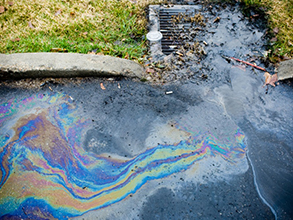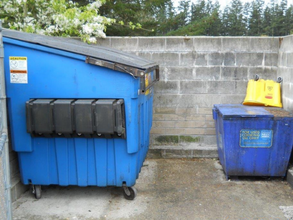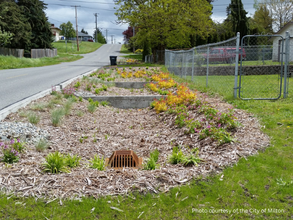Stormwater specialists from local governments are working with businesses to help stop harmful materials and chemicals from entering waterways. This improves the water quality of our streams, lakes and Puget Sound.
Pollutants such as from fertilizers, oils, grease or spills negatively impact salmon, orcas, and other wildlife that depend on clean water in Puget Sound, lakes and streams. By stopping pollutants at the source, businesses can make a significant impact in reducing water pollution.
What is stormwater?
 When it rains or snows, water flows over hard surfaces such as roofs, streets, sidewalks. As the runoff travels to storm drains, ditches and pipes, it picks up pollutants along the way from metals, gasoline, sediment, pathogens and nutrients. Surface and stormwater runoff is the leading transporter of pollution into Puget Sound and our local creeks and streams.
When it rains or snows, water flows over hard surfaces such as roofs, streets, sidewalks. As the runoff travels to storm drains, ditches and pipes, it picks up pollutants along the way from metals, gasoline, sediment, pathogens and nutrients. Surface and stormwater runoff is the leading transporter of pollution into Puget Sound and our local creeks and streams.
About the program
This program requires businesses to take actions to prevent water pollution from sources such as fertilizers, oil, grease, washwater, etc. These pollutants can be prevented from entering stormwater by implementing Best Management Practices (called BMPs for short). This program, mandated by the federal Clean Water Act, will be managed through an inspection program that helps businesses learn how they can prevent water pollution.
What businesses are going to be visited by stormwater staff?
All pollution generating businesses operating within unincorporated Kitsap County and the cities of Bainbridge Island, Bremerton, Port Orchard and Poulsbo are required to comply with the business pollution prevention program, laws and regulations. Examples of businesses that are required to implement BMPs include but are not limited to:
- Automotive body work and repair
- Mobile businesses
- Gas stations
- Restaurants and catering businesses
- Dry cleaners
- Grocery stores
- Businesses with fleet vehicles
What are source control BMPs?
Source control means the control of pollutants from entering storm and surface water. A business is considered the potential "source" of pollutants.
Source control Best Management Practices (BMPs) are actions you can take in your business to help prevent or reduce pollutants from entering the stormwater system and polluting surface or ground water. There are three types of BMPs: operational, structural and treatment.
Operational BMPs are required of all pollutant generating businesses under this ordinance. Common operational BMPs could include:

- Sweeping
- Labeling chemical containers with contents
- Good housekeeping and spill prevention (spill kits, training)
- Properly storing chemicals
- Correctly disposing of wash water
- Keeping dumpster lids closed and area free of trash
- Correct disposal of hazardous waste
When operational BMPs are not effective, structural BMPs may be required. Common structural BMPs include:
- Berms
- Plastic sheeting
- Oil/water separator
- Herbicide/pesticide storage in a covered, dry container
- Spill containment sump
- Covering over dumpster enclosures
- Paving
When structural BMPs are not effective, treatment BMPs may be required. Common treatment BMPs include:
- Biofiltration swales
- Filter strips
- Conveyance of high potential oil spill areas to be directed to sanitary sewer, with an oil/water separator for pre-treatment

Working Together
At a typical visit, our staff will work with the business to evaluate business operations together by:
- Reviewing and evaluating business practices
- Recommending best management practices (BMPs) for stormwater
- Answering questions and providing resources on stormwater laws, regulations and compliance
This one-one-one relationship creates an opportunity for the business to learn about stormwater and how to help keep their community vibrant and healthy. Our hope is that businesses will learn BMPs that will prevent costly maintenance, clean up, repairs or regulatory fines.

